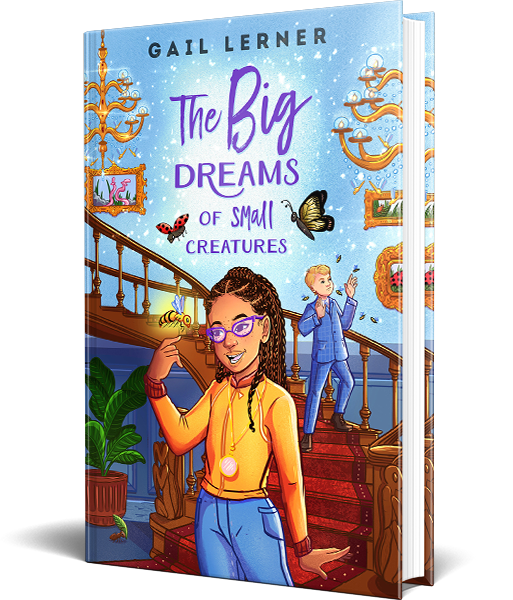The Big Dreams of Small Creatures
Now available!
Ten-year-old Eden’s quiet life is upended when she saves a paper wasp nest from destruction and discovers, to her awe and amazement, that she and its haughty queen can talk to each other. This first conversation is the start of a grand adventure, leading Eden to The Institute for Lower Learning, a secret laboratory devoted to the peaceful coexistence of humans and insects. A turn of the 20th century mansion that has been flipped upside down into a marvelous subterranean sanctuary, the Institute is home to Tillie, its plucky, hundred-and-twenty-year-old caretaker, and a wide range of idiosyncratic insects whose antics range from the ridiculous to the sublime. The Institute is more fantastic and idyllic than Eden could’ve imagined but hidden deep within its tunnels is an old secret that could spell the end for all insects on earth.
Nine-year-old August, an aspiring actor and bullied fourth-grader, is looking for that very secret after a few disastrous encounters have left him wanting to squash every annoying bug into oblivion. After all insects are small—he is big. And if there is anything the world and the tormentors at his school have taught him—it’s that being bigger is what counts.
But in the world of the Institute where insects have a place of their own, both Eden and August discover being bigger isn’t necessarily better and sometimes the most courageous thing to do is to set out to make a new friend.
Praise
—Kirkus Reviews
—Booklist
“An extraordinary and entertaining cast of characters on a remarkable eco-mission. Hopeful, upbeat, and triumphant. Our world literally needs this story in it.”
—Lisa McMann, NYT bestselling author of The Forgotten Five: Map of Flames
“From fumbling fourth-grader August, to introspective, independence-loving Eden, and their friends, both human and insect, Gail Lerner’s characters are a delight, full of heart and humor. The Big Dreams of Small Creatures is a whimsical adventure highlighting the wonders of the natural world—and our sometimes complicated relationship with it—and the importance of kindness, compassion, and seeing things through another’s eyes.”
—Robert Beatty, author of the best-selling Serafina Series and Willa Series
“In the delightful new book, The Big Dreams of Small Creatures by Gail Lerner, a young girl named Eden Evans discovers she can speak WASP: Yes, she can ACTUALLY speak to them, with the help of a kazoo but I digress. From that miraculous discovery to the thrilling, roller coaster ending Eden and August, who is TERRIFIED of insects and wants to destroy them, find conflict and adventure and a whole new world in the coexistence between humans and insects. What an enchanting and wondrous book for young readers.”
—Jamie Lee Curtis, award-winning actress and children’s author
“Gail Lerner’s The Big Dreams of Small Creatures is heartfelt and humorous. Told from two often opposing but equally understandable perspectives, Lerner’s wonderful debut middle grade novel has a staggeringly original concept, richly-drawn characters, a healthy dose of environmental optimism, and a touch of magic. Anyone who reads this lovely book will come away with a better appreciation for how everyone—and every thing—has a place in our world.”
—Stuart Gibbs, author of the bestselling series FunJungle, Spy School and Moon Base Alpha
Excerpt
Eden lay the book back down on the shelf and turned to examine the pens, when she heard a clicking sound behind her. She turned and was stunned to see that the book was now standing upright and rotating to the left, as if it were a key in a lock. Suddenly, the whole bookcase was turning, opening like a door. And although the room it opened onto was cavernous and dark, Eden felt a refreshing breeze sweep across her face. Worried she’d never see the precious book again if she didn’t take it with her, she snatched it off the shelf.
Eden didn’t feel great about taking it. She hated stealing and any kind of dishonesty so much that she’d get upset at her dad for sampling too many grapes at the farmer’s market. He’d laugh and tell her to look around, and Eden would be scandalized to see that nearly every shopper was plucking grapes and cherry tomatoes off their stems and popping them into their mouths before they paid for them. The vendors either didn’t notice or seem to care.
Besides, Eden was planning to return the book as soon as she was done with it. And she was taking it for a good reason, wasn’t she? Getting the tools to communicate with insects was the whole purpose of the Institute. Having convinced herself that she was doing the right thing, Eden stepped into the dark room. And unlike the last time, when the darkness seemed dangerous and forbidding, this time it seemed to promise something wonderful, and she felt as light and optimistic as though she were stepping outdoors into fresh air.
She found herself standing on the bank of a small pond ringed with miniature pine trees. It looked and smelled exactly like the lake behind her grandparents’ summer house, down to the low grasses and reedy cat-o’-nine tails that surrounded it, and the algae covered rocks that occasionally jutted above the surface of the water. She thought for a moment that she’d somehow gotten outside, but then noticed that the blue sky above was actually a painted ceiling, and that the row of larger pine trees beyond the small ones was actually painted wallpaper.
The pond’s surface was dotted with lily pads as round and bright as sequins on a dress. There was no trace of any living creature, but Eden could tell from the abandoned shells of freshly shed nymph skin that draped the banks like cast off costumes, that she’d stumbled upon a dragonfly habitat. For a moment she thought she saw a glimpse of iridescent wings flitting behind a tree, but if it was in fact a dragonfly, it clearly didn’t want to make its presence known.


